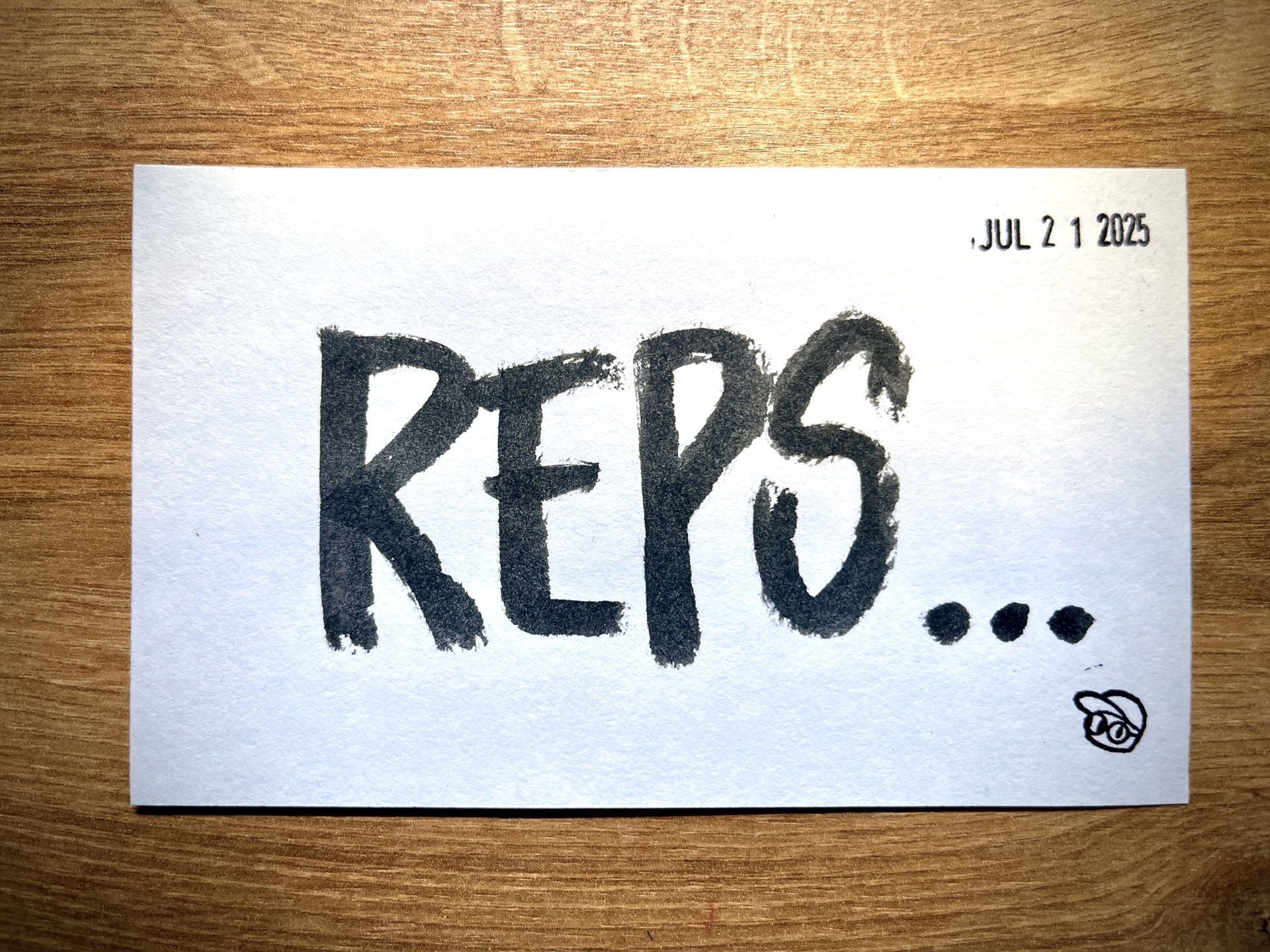Everything you do is a rep.
Every keystroke. Every click. Every message. The question isn’t if you’re practicing—it’s what you’re practicing.
We usually talk about practice like it’s some separate thing.
Something outside your real work. A thing you “go do.” Design drills. Leetcode problems. “Draw 100 circles” exercises.
And yes—those help. But the real question is:
What are you practicing while you work?
Not just what you do, but how you do it. Because if you start paying attention—you’ll realize you’re doing reps all the time.
Chop… chop… chop…
I used to work in kitchens. And when I did, I tried to be conscious of every single cut.
The angle of my knife. The velocity. The precision of each motion. The economy of how my hand reset.
It wasn’t something anyone asked me to do. I just wanted to get better. And that investment paid off.
I got really good. Really confident. And really fast with a knife.
Not because I did extra hours. But because I brought intention into the hours I already had.
That’s not just practice. That’s reps with awareness.
Drawing boxes
You see this in design tools, too.
Watch someone drag a selection box. Which direction do they start? How fast do they move? How many times do they redo the motion? Could they draw two smaller boxes instead of one big one? Could they be faster? Smoother? More precise?
If you’ve ever played real-time strategy games like Starcraft II, you know.
There’s a metric called APM—actions per minute. It tracks how many keystrokes and clicks a player makes. On the surface, it doesn’t seem like it matters. It has nothing to do with game knowledge or map control.
It’s just: how fast can you move? And yet—serious players take it very seriously.
Some literally spend hours just practicing APM.
Spamming keys to jump the camera around.
Drawing boxes around units.
Over and over.
Fine-tuning the muscle memory of motion.
There are even practice maps dedicated to box-drawing. (I’ve spent hours in them.)
Because motion matters.
The faster you move, the faster you can think. The more you can do. The more precise your hands, the more potential your strategy has.
It’s the foundation of your play.
Here’s a clip demonstrating APM from a very old documentary by Razer called The Hax Life:
Often, we want to skip straight to brilliance. We want the big plays. The genius moves. However, your big plays mean nothing if your hands can’t keep up.
---
Sidenote: I’m not saying you need to grind Monkeytype to hit 160WPM just to be a developer. Strategy wins games—not typing speed. But moving a little faster? It helps. Back to the post.
---
Same work. Sharper reps.
We’re already doing so many reps every day.
Navigating folders. Naming layers. Writing commit messages. Typing into a terminal. Drawing shapes. Giving feedback. Sending Slack messages.
You don’t need to add hours to get better.
You just need to notice the reps you already do.
And layer in a little more care. A little more attention. A little more, “Could I have done that smoother?”
That’s it.
Same work. Sharper reps.
The feedback loop
Getting used to noticing your own reps—your own patterns—makes you better at receiving feedback from others.
Because for most of us, feedback is hard. Hearing it is hard. Acting on it is harder. But when you’ve been practicing the habit of self-observation—when you’ve built your own quiet feedback loop into your day—external feedback feels less threatening. Less like calling out. More like calibration.
If you build the muscle of noticing, you’ll stop flinching (or… flinch less) when someone tells you how to improve. You’ve trained for it.
Reps beneath the reps
And sometimes… doing one thing helps you get better at something else entirely.
I do a lot of my planning on physical paper. Not because it’s aesthetic or vintage. But because it helps me process clearly. Visually. Spatially. But there’s something else it does. It helps me practice organizing—not just information, but artifacts. I keep all my papers. I archive them. I revisit them. On purpose.
And even deeper than that… it helps me practice overcoming perfectionism.
I see it in my messy handwriting. In my scribbles. In the things I don’t erase (which I can’t anyway, because I write with a pen).
Every day, I get a quiet little rep in tolerating imperfection. In finishing without polishing. In choosing progress over pride.
Reps to chip away at the hard stuff: perfectionism, impatience, ego.
Not all at once. But in tiny, intentional ways. Over time. Every day.
The work beneath the work
This is what reps can be.
Not just productivity. Not just speed. But reflection. Discipline. Trust. Change.
So take a closer look at your everyday motions. How you move. How you work. What you repeat—without thinking.
Because repetition is inevitable. Growth is optional.
The rep is the same. The difference is whether you notice it.
And once you do… you’ll get sharper. Smoother. Faster.
At the process. At the craft. At just… doing the thing.
One rep at a time.
